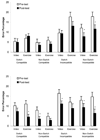Task switching in overweight children: effects of acute exercise and age
- PMID: 18971509
- PMCID: PMC2705951
- DOI: 10.1123/jsep.30.5.497
Task switching in overweight children: effects of acute exercise and age
Abstract
The short-term after effects of a bout of moderate aerobic exercise were hypothesized to facilitate children's executive functioning as measured by a visual task-switching test. Sixty-nine children (mean age=9.2 years) who were overweight and inactive performed a category-decision task before and immediately following a 23-min bout of treadmill walking and, on another session, before and following a nonexercise period. The acute bout of physical activity did not influence the children's global switch cost scores or error rates. Age-related differences in global switch cost scores, but not error scores, were obtained. These results, in concert with several studies conducted with adults, fail to confirm that single bouts of moderately intense physical activity influence mental processes involved in task switching.
Figures
References
-
- Brisswalter JB, Collardeau M, Arcelin R. Effects of acute physical exercise on cognitive performance. Sports Medicine (Auckland, N.Z.) 2002;32:555–566. - PubMed
-
- Bush LK, Hess U, Wolford G. Transformation for within-subject designs: A Monte Carlo investigation. Psychological Bulletin. 1993;113(3):566–579. - PubMed
-
- Casey BJ, Trainor RJ, Orendi JL, Schubert AB, Nystrom LE, Giedd JN, et al. A developmental functional MRI study of prefrontal activation during performance of a go-no-go task. Journal of Cognitive Neuroscience. 1997;9:835–847. - PubMed
-
- Caterino MC, Polak ED. Effects of two types of activity on the performance of second, third, and fourth-grade students on a test of concentration. Perceptual and Motor Skills. 1999;89:245–248. - PubMed
-
- Cepeda NJ, Cepeda ML, Kramer AF. Task switching and attention deficit hyperactivity disorder. Journal of Abnormal Child Psychology. 2000;28:213–226. - PubMed


